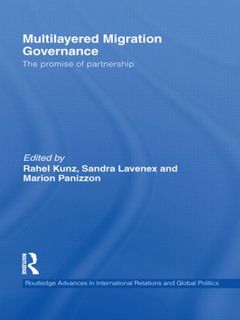Multilayered Migration Governance The Promise of Partnership Routledge Advances in International Relations and Global Politics Series
Coordonnateurs : Kunz Rahel, Lavenex Sandra, Panizzon Marion

Multilayered Migration Governance explores the emerging concept of ?migration partnerships? in political management and governance of international migration flows. The partnership approach to migration seeks to balance responsibility and benefits of migration more evenly between source, transit and destination countries.
Case studies from the US, Europe and Africa analyse the various initiatives and programmes applied in national, regional and transcontinental migration policy today. It shows that a multilayered system of migration governance has emerged which embeds primarily bilateral and mainly control-focused migration partnerships in a broader framework of (trans-)regional and international cooperation providing key links to policy areas in development, trade, finance and security.
Utilising a comparative approach to assess the impact of partnerships on global migration policies, the book will be of interests to scholars and students in migration and development studies and international relations more broadly.
1. Introduction: Governance through Partnerships in International Migration Rahel Kunz, Sandra Lavenex and Marion Panizzon Part 1: Global Perspectives 2. The Global Governance of Migration and the Role of Trans-Regionalism Alexander Betts 3. Coherence and the Regime Complex for International Economic Migration Joel P. Trachtman 4.What Government Networks do in the Field of Migration: An Analysis of Selected Regional Consultative Processes Jobst Köhler Part 2: EU Partnerships 5. Mobility Partnerships: ‘Insecurity partnerships’ for Policy Coherence and Migrant Workers’ Human Rights in the EU Sergio Carrera and Raül Hernández i Sagrera 6. ‘Partnering’ for Migration in EU External Relations Rachel Nellen-Stucky and Sandra Lavenex 7. Facilitating the Temporary Movement of Natural Persons: Economic Partnership Agreements Versus Bilateral Migration Agreements & Mobility Partnerships Natasha Ward 8.The Current Role of the International Organization for Migration in Developing and Implementing Migration and Mobility Partnerships Claire Potaux Part 3: Bilateral Partnerships 9. Franco–African Pacts on Migration: Bilateralism Revisited in Multilayered Migration Governance Marion Panizzon 10. Swiss Migration Partnerships: A Paradigm Shift Odile Rittener, Rosa Maria Losada, Laurent Perriard and Stefano Toscano 11. New Trends in Managing Migration in Canada: Towards a Mobility Paradigm? Hélène Pellerin 12. Depoliticization through Partnership in the Field of Migration: The Mexico–US Case Rahel Kunz
Rahel Kunz is a lecturer at the Institute for Political and International Studies at the University of Lausanne. Recent publications include: ‘"Remittances are Beautiful"? Gender Implications of the New Global Remittances Trend’, Third World Quarterly 29:7, 1391-1411 (2008); "The Crisis of Social Reproduction in Rural Mexico: Challenging the ‘Reprivatisation of Social Reproduction Thesis’", Review of International Political Economy, Special issue on Social Reproduction (2010); and The Political Economy of Global Remittances: Gender and Governmentality, Routledge (forthcoming).
Sandra Lavenex is a professor of International Relations and Global Governance, Institute of Political Science at the University of Lucerne, Switzerland and visiting professor at the College of Europe, Natolin Campus, Poland.
Marion Panizzon is assistant professsor of International Economic Law at the University of Berne and World Trade Institute. She is a regular invited lecturer at the Trade Policy Center in Africa, Arusha, where she teaches on the interface of migration and trade.
Date de parution : 02-2011
15.6x23.4 cm
Date de parution : 10-2012
15.6x23.4 cm
Disponible chez l'éditeur (délai d'approvisionnement : 14 jours).
Prix indicatif 64,97 €
Ajouter au panierThème de Multilayered Migration Governance :
Mots-clés :
mobility; partnerships; partnership; international; irregular; policy; cooperation; circular; global; regional; Cape Verdean; Multilayered Migration Governance; EU Migration Policy; Individual EU Member States; Bilateral Migration Agreements; Migration Partnership; EU Immigration Policy; Mobility Partnerships; Migration Governance; Global Migration Governance; EU External Relation; Gat Mode; Circular Migration Schemes; Visa Facilitation Agreement; EU Member States; Migration Cooperation; Irregular Migration; Migrant Source Countries; Circular Migration; French Pacts; EU Mobility Partnership; Partnership Discourse; Assisted Voluntary Return; Migration Profile; France’s Pacts



